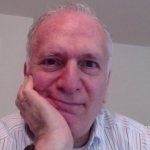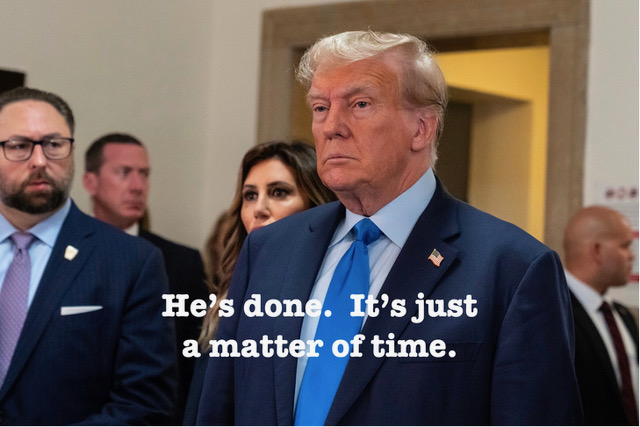Missing the Point – Shaving Donald Trump with Occam’s Razor
I watch entirely too much cable TV news.
Pundit after pundit analyzing Trump treats him as if he’s some sort of political genius and criminal mastermind. He’s neither. That his behavior sometimes befuddles even serious students of American politics, journalists included, is accidental. The fact is, Donald Trump is as dumb as he is nuts – and that, as it turns out, is his secret weapon. He’s an idiot, but someone from whom we have a lot to learn.
To claim that he is a successful entrepreneur is a stretch given how many of his business initiatives have failed, often at the expense of investors who should have known better. His potential windfall profits from taking Truth Social public are a recent case in point. As a social media platform, Truth Social is a bust, nothing more than an unfortunate transfer of wealth from people who believed in Mr. Trump, but shouldn’t have.
Adapting to compensate and improve the likelihood of success.
I knew a woman once, a good person, hardworking, but who wasn’t well educated and not an intellectual powerhouse. Well aware of her shortcomings, she compensated by being highly organized, laser-focused on her objectives, and by developing honest, workaday “tricks” of her own which made her much more efficient and productive than she would have been otherwise. She was also hyper-sensitive to the various personality types she encountered in life. She could smell a lie coming a mile away. No one fooled my mother. That’s right. I am this woman’s son. She’s long gone now, but I still respect her example of the way people can adjust, instinctively and purposefully, to make the most of themselves. It’s one of the many lessons I learned from her that have served me well.
Donald Trump is another, but very different example of someone who has adapted to overcome his deficiencies. Not a bright person or someone who feels constrained by the rule of law or common courtesy, he has succeeded, in large part, by gaming the system. By pushing every rule he encounters to and often beyond its limits. By cheating, lying, and other forms of fraud and outright illegal behavior.
Put it all together, and think about his method in more general terms. Remember Occam’s Razor? The simplest explanation is usually the correct one. Just allow that he’s not all that bright and has some glaring mental/emotional issues and you will have explained almost everything about his behavior – but then we will have missed the point and the lesson to learn from his success.
Donald is over. He’s had it and, sadly, probably realizes it and doesn’t know how to throw in the towel gracefully and with a touch of class. To do so would mean that he’s a loser, the worst possible conclusion for someone with his personality type. Regardless of the evidence to the contrary, he still claims and no doubt believes that he won last time. As he used to say during his last campaign, “The only way we’re going to lose this election is if the election is rigged.” Was that remark nothing more than candidate bravado that we shouldn’t take seriously? Or did he say it as a matter of fact because he couldn’t help himself believe otherwise?
So, what explains his huge and persistent following?
Social psychologists know the answer. I’m not one of them, but I’ll make a layman’s stab at a simple understanding of what they’re talking about. Loyalty to Trump occurs for several related reasons. We all have fragile egos, some of us more so than others, Donald Trump in particular. To bolster our self-images, we sometimes make entirely unwarranted assumptions about what other people are thinking and agree to believe what they do. The greater the following to which we belong, the more likely we are to be right. The act of joining that following reassures us that we know what we’re doing.
Notice how often Donald makes non-specific, unjustified claims about widespread support for whatever misinformation or lie he is espousing? That’s because the alleged wisdom of the crowd makes him and his supporters feel better – and more likely buy into whatever distorted version of the truth he is pushing.
As time goes on, the longer we are committed to the fraud, the more resistant we are to admitting we’ve been wrong. We persist, often to the point of doubling down on our commitment even though circumstances to the contrary may be increasingly evident. In many cases, we may even be reluctant to believe what we hear and see with our own eyes, preferring to ignore or reshape reality instead of suffering the personal humiliation of conceding to it.
Now imagine all that in the context of a lifelong, even multi-generational distrust by members of one political party of members of the other party – and of government in general. And then inject into the phenomenon a political leader, a former President of the United States no less, whose celebrity authority feeds off the distorted hysteria he lives to create.
A teaching experience if ever there was one.
For what it’s worth – and I think it’s worth a great deal – Donald Trump’s career in politics has not been unproductive for our country and our democracy in particular. Far from it. In fact, the mess for which he is the poster boy may, in no small way, have saved us from a far less bearable future.
The rule of law and the nature of our mass media technologies are finally catching up with him and putting his Trumped-up legend to rest, once and for all. The lesson to be learned is how he managed to get this far in the first place. What flaw in the system allowed the likes of Donald Trump to become President? To be a serious contender for re-election despite having attempted to overthrow the legitimate results of the previous election? To recklessly disregard the Constitution after taking an oath to uphold it – an oath that clearly meant nothing to him – without consequences in the polls?
The flaw in the system is the lag, the time it takes for the system to realize and deal with a problem. Lags are everywhere, in our economy, politics, and culture. Some are shorter or longer than others. Some are even multi-generational like the way we are still struggling to come to grips with racism and prejudice in general – even after, long ago, we officially determined that discrimination is wrong.
Systems are, by definition, designed to respond “systematically.” Systems take time to restore order. The effects of chaos and lies, on the other hand, can be instantaneous. The trick for democracy is to survive the spread until its systems catch up with the bad actors.
What Donald Trump has learned is that he can create confusion by lying to people. I say that even though I suspect he actually believes that a great deal of what he says is true, even though it isn’t.
Notice that I’m talking about “confusion,” not “chaos.” The chaos he’s fostered is real, but is getting too much attention. In fact, it’s just a distraction, one significant step removed from the confusion that is the real objective of enemies of the truth. It’s confusion that causes the chaos to occur and persist unchecked.
Confusion is not good for democracy because it affects voter thinking until “the system” has time to correct itself. Why do you think so many millions of people are still willing to vote for Donald Trump? Fundamentally, it’s because they’re confused. The confusion is resolving itself, but taking its time. Trump knows this, instinctively and from his experience over the years, which explains why he is trying so, so hard to postpone his various trials. To stretch out the system lag we’re talking about. Stretch it out long enough and you may even be able to affect the new version of the system that comes out at the end of the process.
Not incidentally, governments in Russia and China understand that confusion, when it comes to the truth, is the kryptonite of democracy. Both countries are continuing to do what they can to disrupt our elections in their favor – with Trump as their unwitting collaborator.
What, if anything, can we do about it? What can we do to improve the responsiveness of our system to the onslaught of lies, to protect the definition of the truth in the meantime? Without excessive censorship, without limiting our freedoms of speech and due process?
For one thing, we need better, more effective opposition messaging. Greatly improved controls over misinformation on social media would also help. Over time, better public education. Otherwise, I have no idea. What I do know is that we need to work really hard and urgently to figure it out.

Les Cohen is a long-term Marylander, having grown up in Annapolis. Professionally, he writes and edits materials for business and political clients from his base of operations in Columbia, Maryland. He has a Ph.D. in Urban and Regional Economics. Leave a comment or feel free to send him an email to [email protected].

